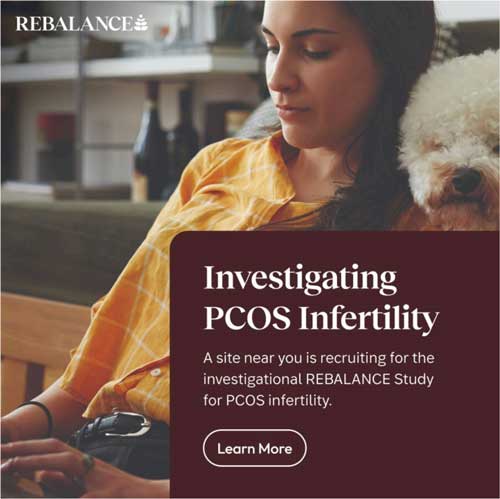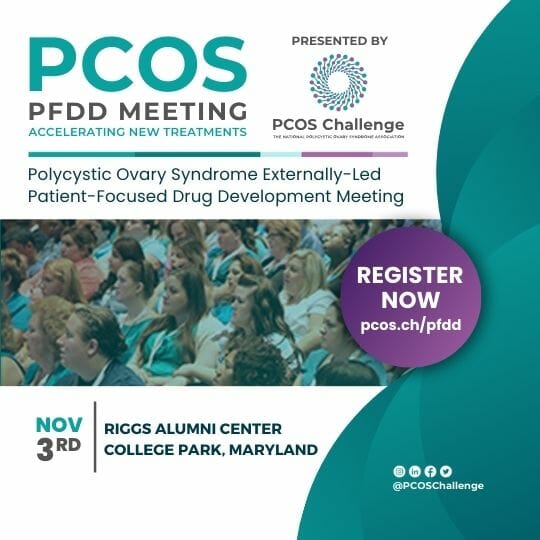PCOS Awareness and Early Intervention
PCOS and COVID-19
- Polycystic ovary syndrome (PCOS) and COVID-19: an overlooked female patient population at potentially higher risk during the COVID-19 pandemic – https://pubmed.ncbi.nlm.nih.gov/32664957/
- Increased COVID-19 infections in women with polycystic ovary syndrome: a population-based study – https://pubmed.ncbi.nlm.nih.gov/33635829/
- Renin-Angiotensin System overactivation in polycystic ovary syndrome, a risk for SARS-CoV-2 infection? – https://pubmed.ncbi.nlm.nih.gov/32838280/
- Coronavirus Disease 2019 (SARS-CoV-2) and polycystic ovarian disease: Is there a higher risk for these women? – https://pubmed.ncbi.nlm.nih.gov/33065278/
Increased Funding Needed
- Perspectives on Polycystic Ovary Syndrome: Is Polycystic Ovary Syndrome Research Underfunded? – https://www.ncbi.nlm.nih.gov/pubmed/29092064
- Our data suggest that PCOS research may be underfunded considering its prevalence, economic burden, metabolic morbidity, and negative impact on quality of life.
PCOS and Maternal-Fetal Health
- Pregnancy complications in women with polycystic ovary syndrome – https://www.ncbi.nlm.nih.gov/pubmed/26117684
- Women with PCOS exhibit a clinically significant increased risk of pregnancy complications compared with controls. Data which were not adjusted for BMI or other confounders demonstrated in PCOS a 3-4-fold increased risk of pregnancy-induced hypertension and pre-eclampsia, a 3-fold increased risk of gestational diabetes and 2-fold higher chance for premature delivery.
- Fetal-maternal outcomes and complications in pregnant women with polycystic ovary syndrome – https://www.ncbi.nlm.nih.gov/pubmed/27310674
- We found that women with PCOS are at greater risk of complications during pregnancy than healthy women, consistent with the results of earlier studies….Compared with healthy women, the women with PCOS were more likely to have a history of miscarriage (42.9% vs. 19.8% P=0.005) and undergo caesarean section (41.2% vs. 21.4%, P=0.019). They were also at increased risk of developing a complication (odds ratio 2.38, 95% CI: 1.05-5.38) or having multiple concurrent complications (odds ratio 8.27, 95% CI: 1.45-47.3)
- Association between polycystic ovary syndrome and the risk of pregnancy complications: A PRISMA-compliant systematic review and meta-analysis – https://www.ncbi.nlm.nih.gov/pubmed/28002314
-
- PCOS in pregnancy was associated with greater risk of gestational diabetes mellitus, preeclampsia, pregnancy-induced hypertension, preterm delivery, cesarean delivery, miscarriage, hypoglycemia, and perinatal death.
- PCOS in pregnancy is associated with a significantly increased risk of adverse pregnancy, fetal, and neonatal outcomes.
-
- Pregnancy complications in polycystic ovary syndrome patients. – https://www.ncbi.nlm.nih.gov/pubmed/25356655
- Implications of polycystic ovary syndrome for pregnancy and for the health of offspring. – https://www.ncbi.nlm.nih.gov/pubmed/26000511
Cardiometabolic Dysfunction in PCOS
-
- Polycystic ovary syndrome, androgen excess, and the risk of nonalcoholic fatty liver disease in women – http://journals.plos.org/plosmedicine/article?id=10.1371/journal.pmed.1002542
-
- Weight Management Interventions in Women with and without PCOS: A Systematic Review. – https://www.ncbi.nlm.nih.gov/pubmed/28885578
-
- Polycystic ovarian syndrome (PCOS): Long-term metabolic consequences. – https://www.ncbi.nlm.nih.gov/pubmed/29024702
-
- The impact of serum adropin and ischemia modified albumin levels based on BMI in PCOS – https://www.ncbi.nlm.nih.gov/pubmed/29465156
-
- Association between polycystic ovary syndrome and the risk of stroke and all-cause mortality: insights from a meta-analysis. – https://www.ncbi.nlm.nih.gov/pubmed/28696807
-
- Metformin therapy for the reproductive and metabolic consequences of polycystic ovary syndrome – https://www.ncbi.nlm.nih.gov/pubmed/28770330
-
- Polycystic Ovary Syndrome (PCOS) in Juvenile and Adult Type 1 Diabetes in a German/Austrian Cohort. – https://www.ncbi.nlm.nih.gov/pubmed/28926868
-
- Cardiometabolic Risk in PCOS: More than a Reproductive Disorder – https://www.ncbi.nlm.nih.gov/pubmed/29128916
-
- CDC – PCOS and Diabetes, Heart Disease, Stroke – https://www.cdc.gov/diabetes/library/spotlights/pcos.html
- Although NIDDK funds little PCOS research, the Institute lists PCOS as an independent risk factor for both prediabetes and metabolic syndrome – https://www.niddk.nih.gov/health-information/diabetes/overview/what-is-diabetes/prediabetes-insulin-resistance
PCOS and Cancer Risk
- PCOS increases the risk of some types of cancer – https://www.nichd.nih.gov/health/topics/pcos/more_information/FAQs/cancer
Mental Health and Adolescent Specific PCOS Research
-
- Health-related quality of life among adolescents with polycystic ovary syndrome – https://www.ncbi.nlm.nih.gov/pubmed/22273414
-
- Young women’s psychological distress after a diagnosis of polycystic ovary syndrome or endometriosis – https://www.ncbi.nlm.nih.gov/pubmed/27412249
-
- An exploration of the hypothesis that testosterone is implicated in the psychological functioning of women with polycystic ovary syndrome (PCOS). – https://www.ncbi.nlm.nih.gov/pubmed/29317066
- Suitability of the National Health Care Surveys to Examine Behavioral Health Services Associated with Polycystic Ovary Syndrome. – Polycystic ovary syndrome and psychiatric disorders: Co-morbidity and heritability in a nationwide Swedish cohort – https://www.ncbi.nlm.nih.gov/pubmed/27513883
- Women with PCOS were still at a significantly increased risk for bulimia, schizophrenia, bipolar disorder, depressive and anxiety disorders, personality disorders…Significantly higher [adjusted odds ratios] were found for autism spectrum disorders ASD in both brothers and sisters of women with PCOS, and for depressive, anxiety, and schizophrenia spectrum disorders in the sisters only…Attempted suicide were 40% higher in women with PCOS and 16% higher in their unaffected sisters. Elevated risk in their siblings suggests shared familial factors between PCOS and psychiatric disorders. This study is an important first step towards identifying the underlying mechanisms for risk of psychiatric disorders in women with PCOS. Health professionals treating women with PCOS should be aware that these patients – as well as their family members – are important targets for mental health care.
Environmental Factors/Endocrine Disruptors/Socioeconomic Factors
- Environmental determinants of polycystic ovary syndrome. – https://www.ncbi.nlm.nih.gov/pubmed/27240194
Ethnic Based Guidelines Needed/Health Disparity
- Ethnic differences in the phenotypic expression of polycystic ovary syndrome – https://www.ncbi.nlm.nih.gov/pubmed/23624030




